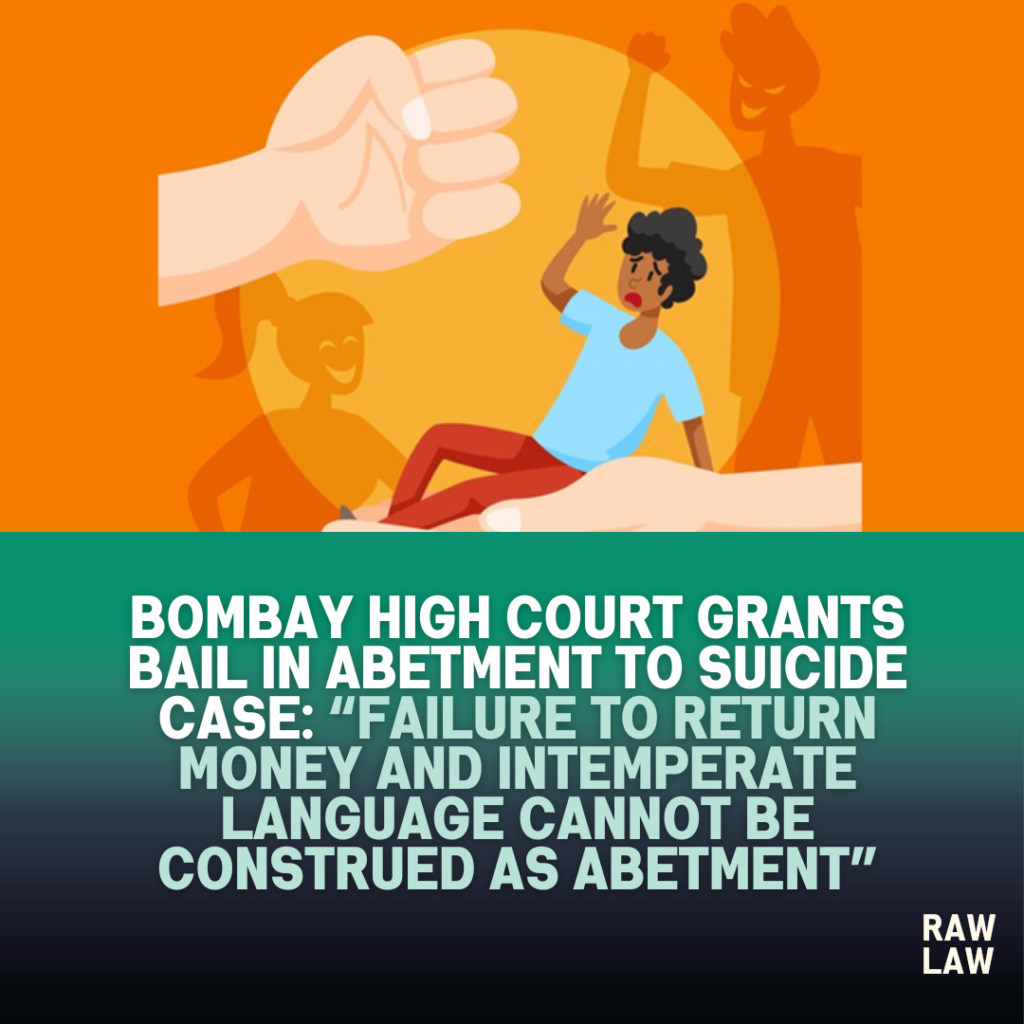Court’s Decision
The Bombay High Court granted bail to an individual accused of abetment to suicide under Section 306 of the Indian Penal Code. The Court found that the mere non-refund of money and the use of “intemperate language” could not establish a prima facie case of abetment. It clarified that to attract Section 306, there must be “active instigation or direct involvement in the act of suicide.” It observed:
“Prima facie, mere non-refund of money or use of intemperate language will not constitute an offence under Section 306 of IPC.”
Facts
The complainant, who was the wife of the deceased, alleged that the deceased had invested ₹25 lakhs in the business of the applicant and his brother in 2022. She claimed that despite repeated demands, the amount was not refunded, and that the accused used abusive language against the deceased over a phone call. On 12 October 2022, the deceased consumed poison, and a suicide note allegedly naming the applicant and his brother was recovered.
A First Information Report was registered under Sections 306 and 34 of the Indian Penal Code. The applicant was arrested on 13 October 2022 and subsequently moved for bail before the Sessions Court, which rejected the application. He then approached the High Court.
Issues
- Whether a prima facie case of abetment to suicide under Section 306 of the IPC is made out based on the suicide note and surrounding circumstances.
- Whether the continued custody of the accused is necessary given the facts and materials on record.
Petitioner’s Arguments
The applicant contended that the suicide note relied upon by the prosecution was of suspicious origin, lacked legal authenticity, and did not contain any direct incitement to suicide. He argued that even if the allegations were accepted at face value, there was no material showing direct instigation or active participation in the act of suicide. It was submitted that the alleged transaction was a civil dispute over money, and even if there was a delay in repayment, it could not be considered abetment. The applicant also pointed out that he had cooperated with the investigation and no custodial interrogation was required.
Respondent’s Arguments
The State opposed the bail application, submitting that the deceased had left behind a suicide note naming the applicant and his brother, holding them responsible for his death. It was argued that the mental agony caused by the repeated denial of repayment and the verbal abuse led the deceased to end his life. The State emphasized the serious nature of the offence and contended that the applicant’s custodial presence was still required for further investigation.
Analysis of the Law
The Court examined the essentials of Section 306 IPC and reiterated that to establish abetment, there must be a “clear mens rea” and “an element of instigation or active participation.” The Court relied on settled legal principles to hold that mere harassment, insult, or failure to return money does not by itself amount to abetment unless it can be shown that it drove the deceased to take the extreme step.
The judgment underscored that suicide notes naming a person are not conclusive and must be weighed with other surrounding evidence to assess culpability under Section 306.
Precedent Analysis
While the Court did not explicitly cite other Supreme Court decisions, it relied on long-standing principles laid down in:
- M. Arjunan v. State, (2019) 3 SCC 315: The Supreme Court held that to attract Section 306, there must be a clear mens rea to commit the offence and some active or direct act that led the deceased to commit suicide.
- Gurcharan Singh v. State of Punjab, (2017) 1 SCC 433: The Court had held that the offence of abetment involves a mental process of instigating a person or intentionally aiding a person in doing a thing.
Though not cited in the judgment explicitly, the legal reasoning employed was in line with these authorities.
Court’s Reasoning
The High Court found that the ingredients of abetment were not satisfied. It observed that the nature of allegations—failure to repay money and alleged verbal altercation—did not indicate any active provocation or instigation. The Court held that a financial transaction dispute, even if accompanied by harsh words, could not be stretched to constitute abetment under Section 306 unless there was clear evidence of intention and direct inducement.
It also noted the applicant’s custodial period and cooperation with the investigation, stating that further incarceration was not justified.
Conclusion
The Bombay High Court allowed the bail application and directed the release of the applicant on executing a personal bond of ₹25,000 with one or more sureties. The applicant was directed not to tamper with evidence or influence witnesses and to report to the investigating officer on specific dates.
Implications
This decision reinforces the principle that criminal liability for abetment to suicide cannot be inferred lightly. It protects individuals from being prosecuted solely based on delayed financial transactions and emotionally charged suicide notes. The judgment is crucial in maintaining the distinction between civil wrongs and criminal liability under the stringent standards of Section 306 of the IPC.
FAQs
1. Does a suicide note automatically prove abetment to suicide?
No. A suicide note naming a person must be corroborated with evidence of active instigation or intent to provoke the suicide.
2. Can financial disputes give rise to abetment to suicide charges?
Not unless there is direct provocation, harassment, or clear intention to drive the person to commit suicide.
3. What is required to make out a prima facie case under Section 306 IPC?
There must be material indicating a direct act of instigation, intentional aid, or mental pressure leading to the suicide.
